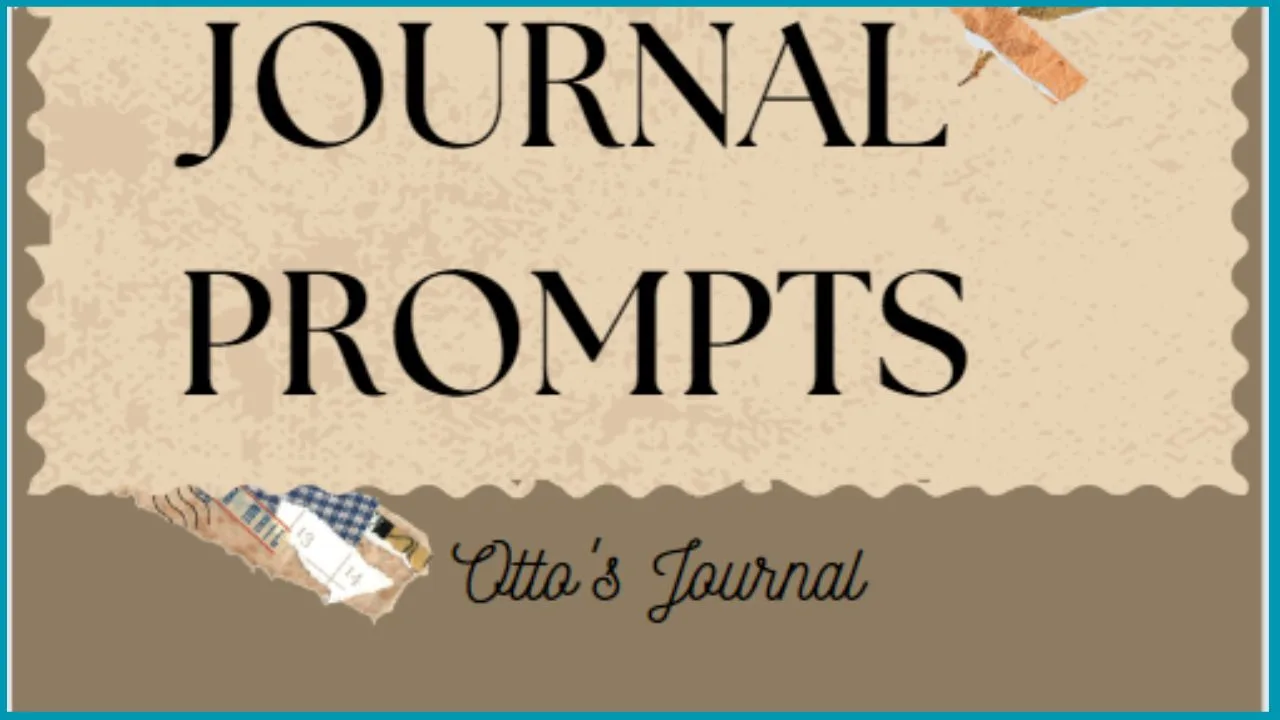Journaling can be an effective strategy for managing mental health. It offers a secure, compassionate environment in which to process ideas, feelings, and experiences. However, it can be difficult to come up with journaling questions that are primarily focused on mental health. In this post, I will share with you 250 journaling prompts for mental health and show you how you can create your own personal prompts
If you or someone you know is struggling with mental illness, please call the National Alliance on Mental Illness Help Line at 1-(800)-950-NAMI (6264) or visit their website
Journaling prompts for mental health
Here are 101 journaling prompts to support mental health and self-reflection. You can use these prompts to explore your thoughts, feelings, and experiences, as well as promote self-awareness and emotional well-being:
- Describe a recent situation that made you feel anxious or stressed. What triggered these emotions, and how did you react?
- Write a letter to your future self offering words of encouragement and support.
- List three things you’re grateful for today and explain why they bring you joy.
- Reflect on a past challenge you’ve overcome. What did you learn from that experience, and how did it shape you?
- Explore a childhood memory that holds a special place in your heart. What emotions and lessons does it evoke?
- Document your daily routine, highlighting any self-care practices or habits that positively impact your mental well-being.
- Write about a book or movie that has had a profound impact on your life and mental health.
- Create a list of your short-term and long-term mental health goals. How do you plan to achieve them?
- Describe your ideal self. How does this ideal version of you think, feel, and act?
- Write a forgiveness letter to someone who has hurt you in the past, even if you never intend to send it.
- Detail a self-care ritual that you can practice regularly to nurture your mental health.
- Describe your “safe space” where you go to find solace and peace when feeling overwhelmed.
- List the people in your life who provide you with the most emotional support and describe how they help.
- Reflect on a mistake you’ve made recently. What lessons did you learn from it?
- Explore a fear or phobia you have. What’s its origin, and how does it affect your daily life?
- Write about a time you felt truly content and at ease. What were the circumstances, and how can you recreate that feeling?
- Document your self-talk for a day. Are you being kind and compassionate to yourself, or are you self-critical?
- Describe a person who inspires you and explain why their qualities are meaningful to you.
- Explore a recurring dream or nightmare. What do you think it symbolizes, and how does it relate to your mental state?
- List five things you can do to manage stress when it becomes overwhelming.
- Write a letter to someone you love expressing your gratitude and affection for them.
- Reflect on your daily screen time and its impact on your mental well-being. Are there changes you’d like to make?
- Describe your favorite relaxation technique or mindfulness exercise.
- Document the achievements, big or small, that you’re proud of in the past year.
- Explore your relationship with food. How does it affect your emotions and mental health?
- Write a letter of forgiveness to yourself for any past mistakes or perceived shortcomings.
- List your favorite songs, and write about how they make you feel.
- Reflect on a recent success or accomplishment. How did it make you feel, and what did you learn from it?
- Explore your body image and self-esteem. What steps can you take to improve your self-image?
- Describe a place you’ve never been but would love to visit. How would this trip positively affect your mental health?
- List your favorite self-help or mental health books. Explain how they’ve influenced your journey.
- Write about a time when you felt overwhelmed by negative thoughts. How did you pull yourself out of that mindset?
- Document your favorite self-care activities and how often you engage in them.
- Reflect on your relationship with time. Do you often feel rushed or stressed by deadlines? How can you manage your time more effectively?
- List the qualities and strengths that make you unique. Celebrate what sets you apart.
- Explore a goal or aspiration you’ve held for a long time but haven’t pursued. What’s holding you back, and how can you take the first step?
- Describe a person or event that has hurt you in the past. How has this experience shaped your perspective?
- Write a letter to your younger self, offering guidance and reassurance.
- Reflect on your past relationships. What patterns or lessons can you identify?
- Document the activities that bring you joy and make you forget about your worries.
- List the things that make you laugh or smile. How can you incorporate more humor into your life?
- Explore your core values and beliefs. How do they influence your decisions and mental well-being?
- Write about a time you overcame a significant obstacle. What strengths and resilience did you discover within yourself?
- Reflect on the people or situations that drain your energy and contribute to stress. How can you set boundaries with them?
- Describe a favorite childhood game or hobby that brought you happiness. Can you reintroduce it into your life?
- Document your most significant regrets. What can you learn from them, and how can you make amends?
- List your top five sources of stress and brainstorm strategies to manage them.
- Write a letter to someone you need to forgive, even if it’s difficult.
- Reflect on your ideal work-life balance. Are you currently achieving it, and if not, how can you make changes?
- Explore your dreams and aspirations for the future. What steps can you take to work towards them?
- Describe your morning routine and its impact on your mental state throughout the day.
- List your favorite affirmations and mantras. How do they influence your mindset?
- Reflect on the last time you felt truly at peace with yourself. What led to this feeling, and how can you recreate it?
- Write a letter to your body, expressing appreciation for its resilience and strength.
- Explore your guilty pleasures and why they bring you comfort.
- Document the ways you cope with anxiety and stress. Are there healthier alternatives you can explore?
- List five things you love about yourself, both physically and mentally.
- Reflect on your support system. Who can you reach out to when you’re struggling with your mental health?
- Describe a time when you felt a strong sense of accomplishment. What did you do, and how did it impact your self-esteem?
- Write about your ideal day, from morning to night, focusing on self-care and happiness.
- Explore a recent challenge you’ve faced. What strategies did you use to overcome it?
- Document the moments when you felt most confident and self-assured. What led to these feelings?
- List your favorite relaxation activities, such as meditation, yoga, or deep breathing exercises.
- Reflect on your fears and anxieties. How do they manifest in your life, and what can you do to confront them?
- Write a letter to someone who has supported you during a difficult time, expressing your gratitude.
- Explore a recent act of kindness you’ve received or given. How did it affect your mental state?
- Describe a situation where you felt overwhelmed by self-doubt. What steps can you take to boost your self-confidence?
- Document your daily accomplishments, no matter how small they may seem.
- List the people in your life who make you feel loved and accepted for who you are.
- Reflect on a decision you regret. What have you learned from this experience, and how can you use it to make better choices in the future?
- Write about a role model who has influenced your mental health journey and explain how their example has helped you.
- Explore your relationship with social media and its impact on your self-esteem.
- Document the qualities that make you a good friend and how your friendships positively influence your mental well-being.
- List your favorite ways to de-stress after a long day.
- Reflect on your past accomplishments and achievements. How do they make you feel proud of yourself?
- Write a letter to your inner critic, acknowledging its presence but affirming your self-worth.
- Explore your habits and routines. Which ones nurture your mental health, and which ones hinder it?
- Describe a moment when you felt deeply connected with nature and its calming effect on your mind.
- Document your experiences with therapy or counseling. How have these sessions impacted your mental well-being?
- List your favorite quotes or sayings that inspire you during challenging times.
- Reflect on the last time you practiced self-compassion and how it affected your mental state.
- Write about a time when you felt vulnerable or exposed. How did you cope with those feelings?
- Explore your communication style and its impact on your relationships and mental health.
- Document the moments when you’ve felt the most supported by someone. How did their presence make a difference in your life?
- List the things that bring you comfort and a sense of security.
- Reflect on the last time you took a break and truly relaxed. How did it recharge your mental energy?
- Describe a time when you made a difficult decision and the factors that influenced your choice.
- Write about a recent act of kindness you’ve witnessed or been a part of. How did it brighten your day?
- Explore your ideal self-care day. What activities would you include to nurture your mental health?
- Document the ways you express gratitude daily, both to others and to yourself.
- List your favorite self-help or mental health apps and how they’ve benefited you.
- Reflect on your relationships with family members and how they impact your mental well-being.
- Write a letter to a person who has caused you harm. Express your feelings, even if you never intend to send it.
- Explore a recent “aha” moment where you gained new insight into your emotions or behavior.
- Describe a time when you felt deeply relaxed and at peace with your surroundings.
- Document the ways you handle stress at work or school. Are there improvements you can make in this area?
- List your favorite self-compassion exercises and how they help you be kinder to yourself.
- Reflect on your happiest childhood memory and what makes it so special.
- Write about the last time you pushed yourself out of your comfort zone. What did you learn from that experience?
- Explore your daily affirmations or mantras and how they positively impact your mindset.
- Document your experiences with journaling and how it has supported your mental health journey.
How to write mental health Journal prompts.
Brainstorming
Spend time brainstorming ideas for journal prompts. Consider the types of mental health issues that are most important to you, such as feeling depressed, anxiety, stress, and/or trauma.
Ask yourself questions
Pose open-ended questions to yourself about your current mental state. Questions can help you explore and identify the root causes of your mental health issues.
Focus on feelings
Identify and explore your emotions related to mental health issues. Use questions that focus on self-awareness, such as “How do I feel when I think about this issue?” or “What makes me feel most vulnerable?”
Examine your narrative
Reflect on how you perceive and talk to yourself about mental health issues. Consider writing questions that challenge the stories you tell yourself, such as
“What is another way I can look at this?” or “What evidence do I have to support my interpretation of this situation?”
Think about your coping mechanisms
Do a self-reflection and identify what helps you to cope with mental health challenges. Ask yourself questions like
“What coping strategies do I use to take care of myself when I’m feeling overwhelmed?” or “How can I make sure that I am taking time for self-care in my life?” What are the best coping skills under these circumstances?
Reflect on your previous relationships
Explore how your past relationships and experiences shape your current mental health. Consider writing questions such as “What did I learn from my previous relationships?” or “How has my history shaped how I view myself today?” How has it affected my current relationship?
Reflect on behavioral activation.
Recognizing and reversing patterns of anxious thinking can help to reduce symptoms of anxiety. Ask yourself questions such as “What triggers my anxiety?”,
“How does my anxiety affect others around me?” or “What thoughts cause me the most distress when I am feeling anxious?”
Benefits of journaling for mental health.
Promotes positive psychology
Through therapy journal writing, you can gain insight into your mental health. This enables you to have a greater understanding of yourself and further develop a more positive outlook on life.
Boosts self-awareness
Journaling can help you track your emotions and behaviors, which increases your self-awareness. You’ll become more cognizant of how your thoughts and emotions are impacting your life.
Improves emotional regulation
Journaling has been linked to improved emotional regulation, which is the ability to manage and control your emotions. You’ll be better able to identify, express, and cope with difficult feelings when they arise.
Reduces stress levels
Writing journal entries can help you relieve stress and tension healthily and productively. You can take the time to express your worries, fears, and frustrations without the fear of judgment or rejection.
Increases resilience
Writing about stressful events can help you build resilience and gain a better understanding of how to cope with difficult situations. You’ll learn how to identify patterns in your behavior through well-being and therapeutic journal prompts.
Helps control emotional distress.
Journaling can provide an important outlet for your emotions, allowing you to process and manage them healthily. Writing about your feelings can help reduce stress, aid problem-solving, and boost self-esteem.
Builds problem-solving skills
Writing helps you become more aware of the problems that are affecting your mental health. Practicing online positive affect journaling, for example, can help you examine the situation and find solutions. You’ll become more adept at problem-solving over time.
Increases self-esteem
Journaling can be a powerful tool to boost your self-esteem in both the short and long term. Writing about your achievements, successes, and positive qualities helps you build self-confidence and become more aware of your worth. It can help you deal with your borderline personality disorder.
Enhances creativity
Writing can help unleash your creative side and provide a platform to explore different angles and perspectives on issues you’re grappling with.
You’ll be able to freely express yourself without the fear of judgment or criticism, allowing you to tap into a newfound emotional expression and self-belief.
Bullet key journal symbols for mental health.
Here are the top bullet journaling keys to start your mental health journal.
- ☯️ = Finding inner calm
- ✍️ = Processing emotions
- ⏰ = Making time for self-care
- 🤔 = Reflection and mindfulness
- 😊 = Positive reinforcement
- 👩⚕️ = Seeking professional help
- ❤️= Self-love and acceptance
- ☁️ = Acknowledging stress and anxiety
- 📝 = Writing about your experiences
- 👩🎨 = Expressing creativity
- ⚡️ = Learning new skills
- ♻️= Setting goals and forming habits
- 😌 = Creating balance in life
- 🤝 = Connecting with others
- ✅ = Celebrating your successes.
Therapeutic Journal Prompts for Mental Health
Therapeutic journal prompts are a vital tool for managing difficult emotions during difficult times. They encourage individuals to reflect on their thoughts and feelings in a professional tone while keeping a relatable manner.
An example could be, “Write about a time when you faced a hard time and how you managed your emotions.” These prompts act as a personal therapist, guiding you to explore your emotions, and facilitating self-discovery and emotional processing.
Daily Journal Questions for Mental Health
Daily journal questions for mental health are designed to help individuals navigate their emotions and mental well-being every day. These questions often include terms like “the first thing” or “every day” to emphasize consistency.
A typical question might be, “What are the first three things you can do every day to boost your mental health?” This approach fosters a professional yet relatable routine of self-care, offering the best ways to maintain emotional well-being.
Creative Writing Prompt for Mental Health
Creative writing prompts for mental health are a unique approach to self-expression during challenging times. These prompts encourage individuals to explore their thoughts and feelings through creative outlets.
An example could be, “Write a short story where the main character overcomes a personal struggle.” By infusing creativity, individuals can address difficult emotions in a non-conventional yet therapeutic way, providing an alternative method of emotional processing.
Journal Prompts for Emotional Processing
Journal prompts for emotional processing are invaluable when you’re dealing with challenging emotions. They help individuals put their thoughts and feelings into words and encourage them to get started.
For instance, “Write about a recent event that triggered strong emotions and describe how it made you feel.” These prompts guide individuals to delve into their emotional landscape, facilitating a professional and relatable manner of self-reflection.
What to Write in an Anxiety Journal
In an anxiety journal, you should write about your thoughts and feelings during difficult times. Record 10 things that triggered your anxiety during the day and 5 things you did to cope with it.
This structured approach helps individuals identify their anxiety triggers and establish the best ways to manage their emotions in a professional and relatable manner. It’s a powerful tool to track your anxiety patterns and work on coping strategies.
What to Write in a Coping Journal
A coping journal is a place to document how you handle difficult emotions during hard times. Write about the coping strategies you’ve used and the 10 things that made you feel better.
By keeping a professional tone and relating your experiences, you can create a personalized guide to navigate challenging emotions and improve your emotional well-being.
How to Journal When Overwhelmed
When overwhelmed, journaling can be a lifeline. Start by jotting down 5 things that are causing you to feel overwhelmed and then write about how you plan to address them. This approach keeps a professional tone while offering a relatable method to tackle difficult emotions. It’s a structured way to regain control during hard times.
Common Coping Statements
Common coping statements are positive affirmations that help individuals manage their difficult emotions. These statements include terms like “someone else” to remind you that you are not alone in your struggles.
For instance, “I am not alone; many people face difficult times, and I can overcome this.” Using these statements in your journal reinforces a professional yet relatable approach to self-encouragement and emotional management.
How to Write a Trauma Journal
Writing a trauma journal is a crucial step in processing difficult emotions related to traumatic experiences. Start by recording the event, your thoughts and feelings, and how it has affected your life.
This professional and relatable approach helps individuals confront their traumas, manage difficult emotions, and work toward healing and recovery. It’s an effective tool for acknowledging and addressing the hard times in one’s life.
Final words.
Journaling can be a powerful tool in your mental health journey. It can provide an outlet to express your thoughts and feelings, reduce stress levels, enhance creativity, and increase self-awareness. With the right approach and prompts, you’ll find it easier to process difficult situations.
So give journaling a try today and reap the many benefits it can offer your mental distress. Remember, there’s no right or wrong way to journal – it’s all about finding what works for you.
Whether a love letter or personal note, a journal entry can be an invaluable part of your mental health journey, helping you gain clarity and direction as well as keep motivated and focused. So start writing today. You never know where it might take you!
Bullet journaling is my favorite form of mental health journaling. It is the best compliment for my busy lifestyle and constantly racing mind. On a perfect day or when am having a hard time, it helps me to journal about my loved ones




